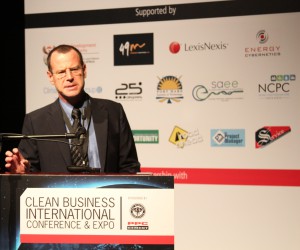It is no secret that South Africa’s industrial economy is built on 'cheap coal'.
This fossil fuel dependence makes the country one of the 30 largest emitters of greenhouse gases globally and amongst the highest per capita carbon emitters.
The bulk of Greenhouse Gas (GHG) emissions in South Africa continues to come from the energy sector, which contributed 78% of South Africa’s total GHG in 1994, and more than 90% of carbon dioxide emissions.
This is according to Edwin Ritchken, strategy advisor to the minister and director-general of the Department of Public Enterprises.
Ritchken said at the PPC Clean Business International Conference this week in Midrand that in this energy-intensive, coal-dependant, high emission context, South Africa has adopted a proactive approach towards playing its part in combating the global challenges associated with climate change.
"At the COP 15 [the United Nations backed Copenhagen Climate Change Conference's Congress of the Parties 15], President Jacob Zuma committed to achieving a 34% deviation below the ‘business as usual’ emission trajectory by 2020, and 42% deviation by 2025. In pursuit of this goal and the green economy, South Africa has finalised its National Climate Change Response Paper. This white paper serves as the government’s vision for an effective climate change response and the long-term transition to a climate resilient and low-carbon economy and society.
As the shareholder ministry of major parastatals, the Department of Public Enterprises has completed a process of defining a policy to guide parastatals in their engagement with the climate change and green economy challenge.
"I am pleased to launch this framework today. The overarching objective of the framework is to optimise the impact of the SOC on the reduction of carbon emissions and development of the green economy without compromising SOC's [State Owned Enterprises] financial viability," Ritchken said.
The four key design principles informing the policy are:
- The SOC needs to focus on optimising the overlap between commercial, economic, developmental and environmental objectives, whilst carefully managing areas where these objectives conflict.
- It is expected that over time, climate change, broader environmental and green economy considerations will be integrated into the heart of SOC planning, procurement and operational processes - however this will be an on-going process or learning and continuous improvement, rather than a big-bang.
- Each SOC requires flexibility in the way it responds to the challenges of climate change given the diversity of sectors within which the SOC operate.
- The development of the green economy requires a high level of collaboration across SOC and between SOC and government and the shareholder will have to play a facilitating role in this regard.
The focus of the policy is thus to start the process of integrating climate and green economy considerations in the SOC planning processes and to facilitate a high level of collaboration between the SOC and government to enable the efficient implementation of green economy initiatives.
As a starting point, the policy aims to ensure that the parastatals begin a process of systematic and continuous learning around how to engage with the opportunities and risks associated with climate change.
Over time, it is expected that this will be integrated into the standard SOC planning cycle.
Ritchken said that the policy has not set targets relating to SOC emission reduction or for the investment they promote in green economy initiatives.
As a starting point, we would like the SOC to set their own targets based on what they believe they can achieve.
It is notable that Transnet has already reported on their carbon footprint in their annual report and has tied their management incentives to reducing these impacts.
This suggests that the SOC are engaging in both the letter and the spirit of the policy.
As part of our commitment to sustainable development today we, the DPE and the SOC, in our portfolio have signed onto the United Nations global compact, the world’s largest voluntary corporate citizenship initiative.
"The DPE takes pride in ensuring that our SOC play a leadership role in the transition to a low carbon economy and that they are committed to broader sustainable development objectives and philsophies. We hope that all South African businesses will follow our example", Ritchken concluded.










